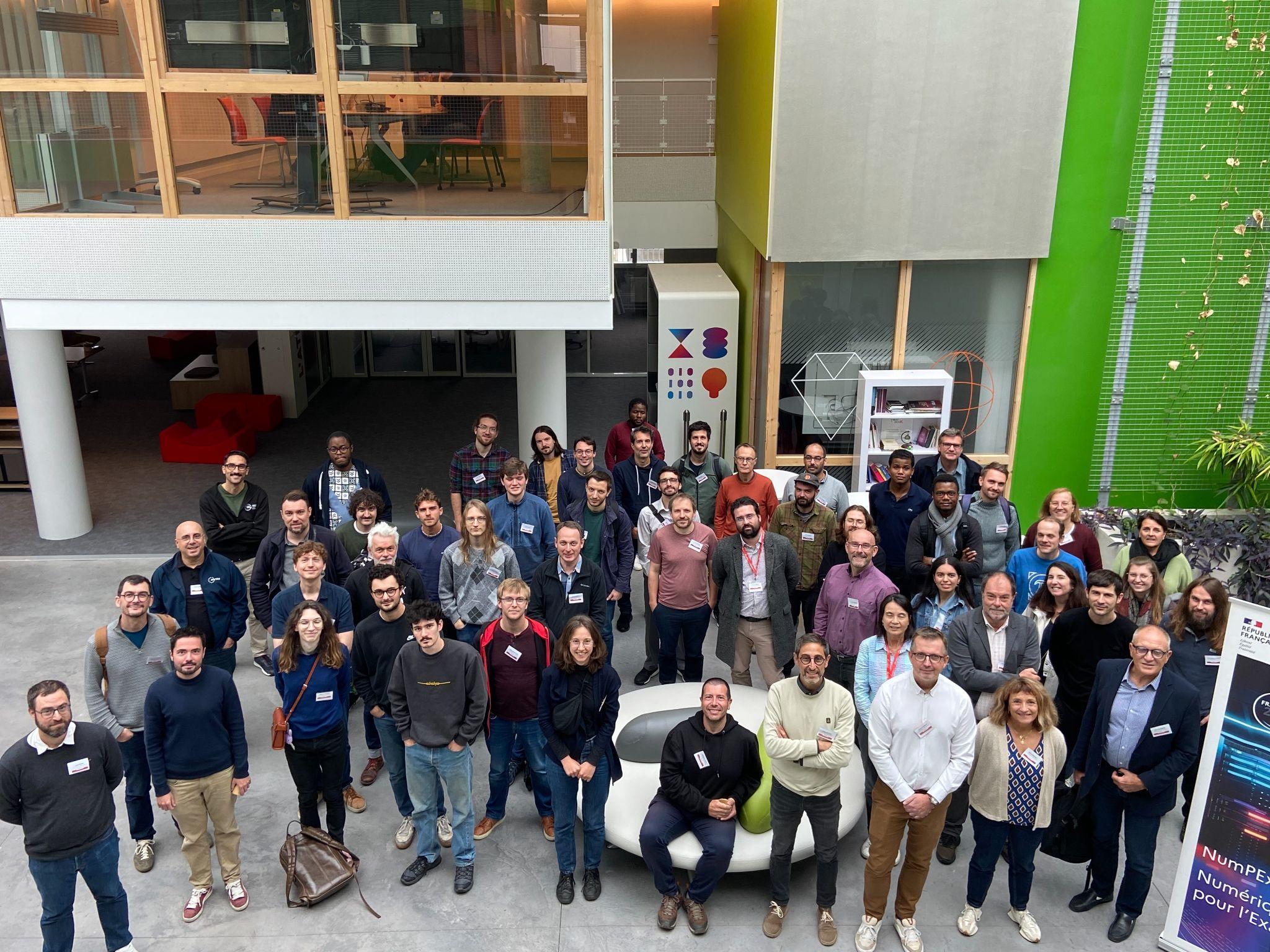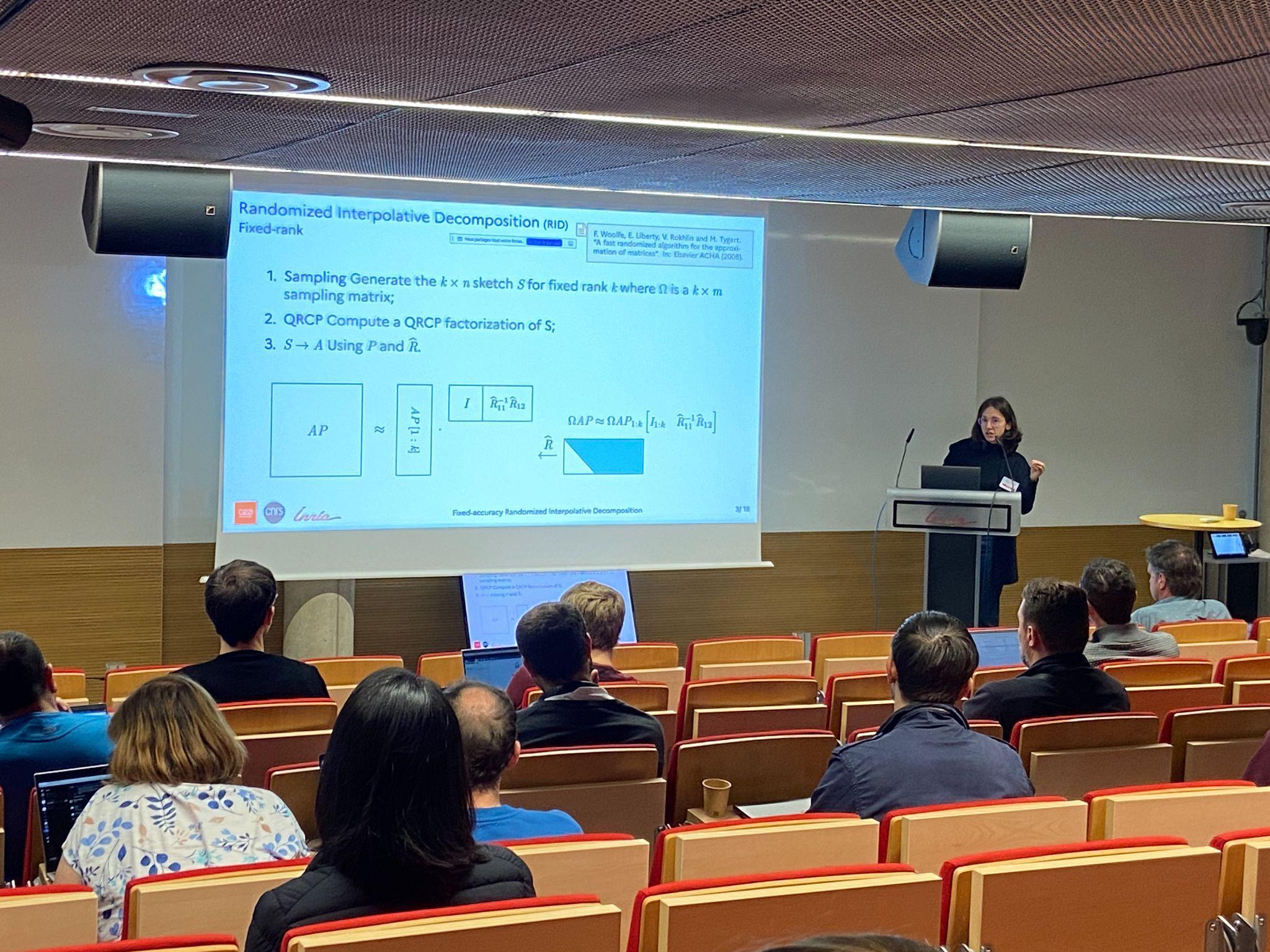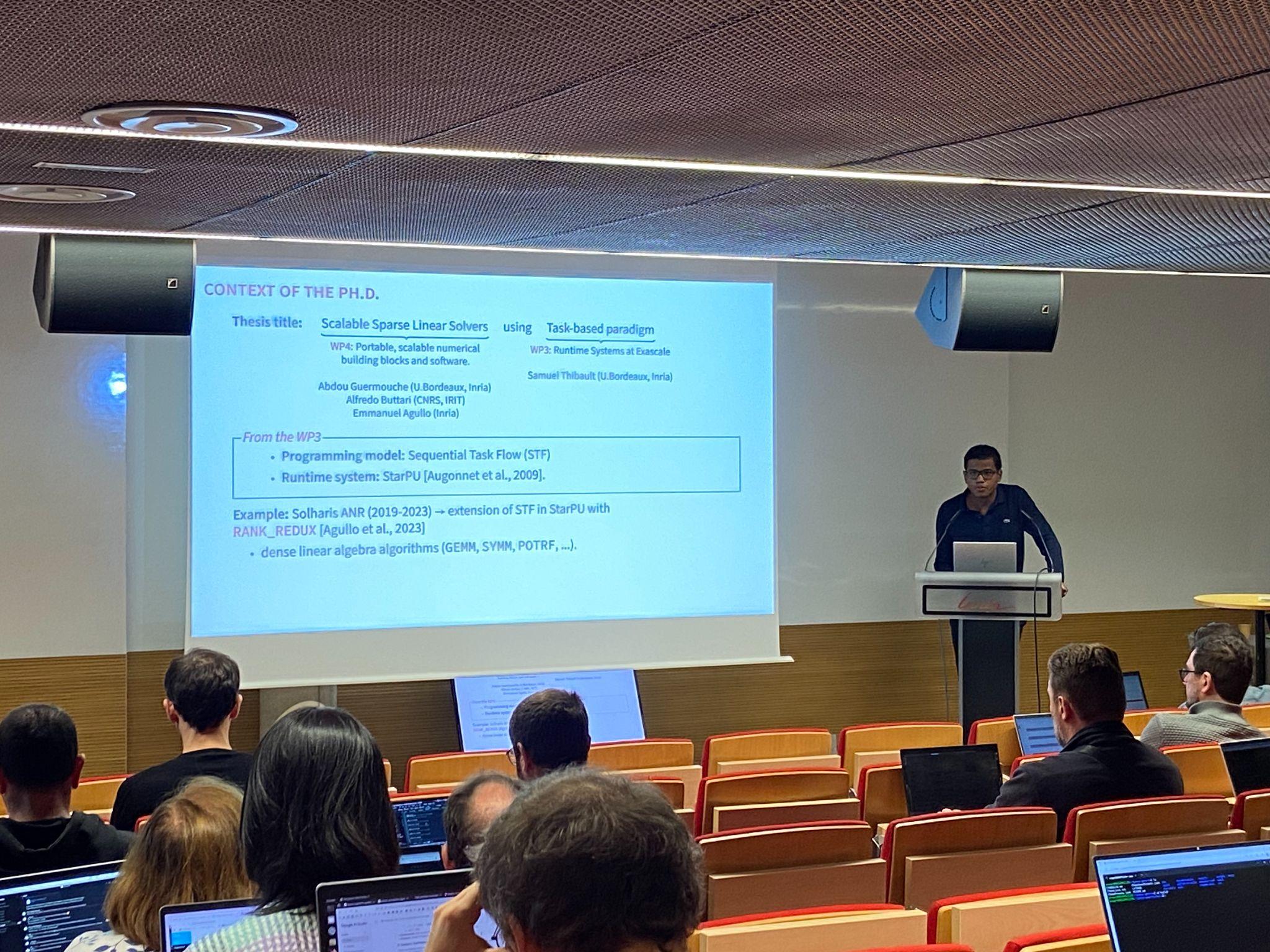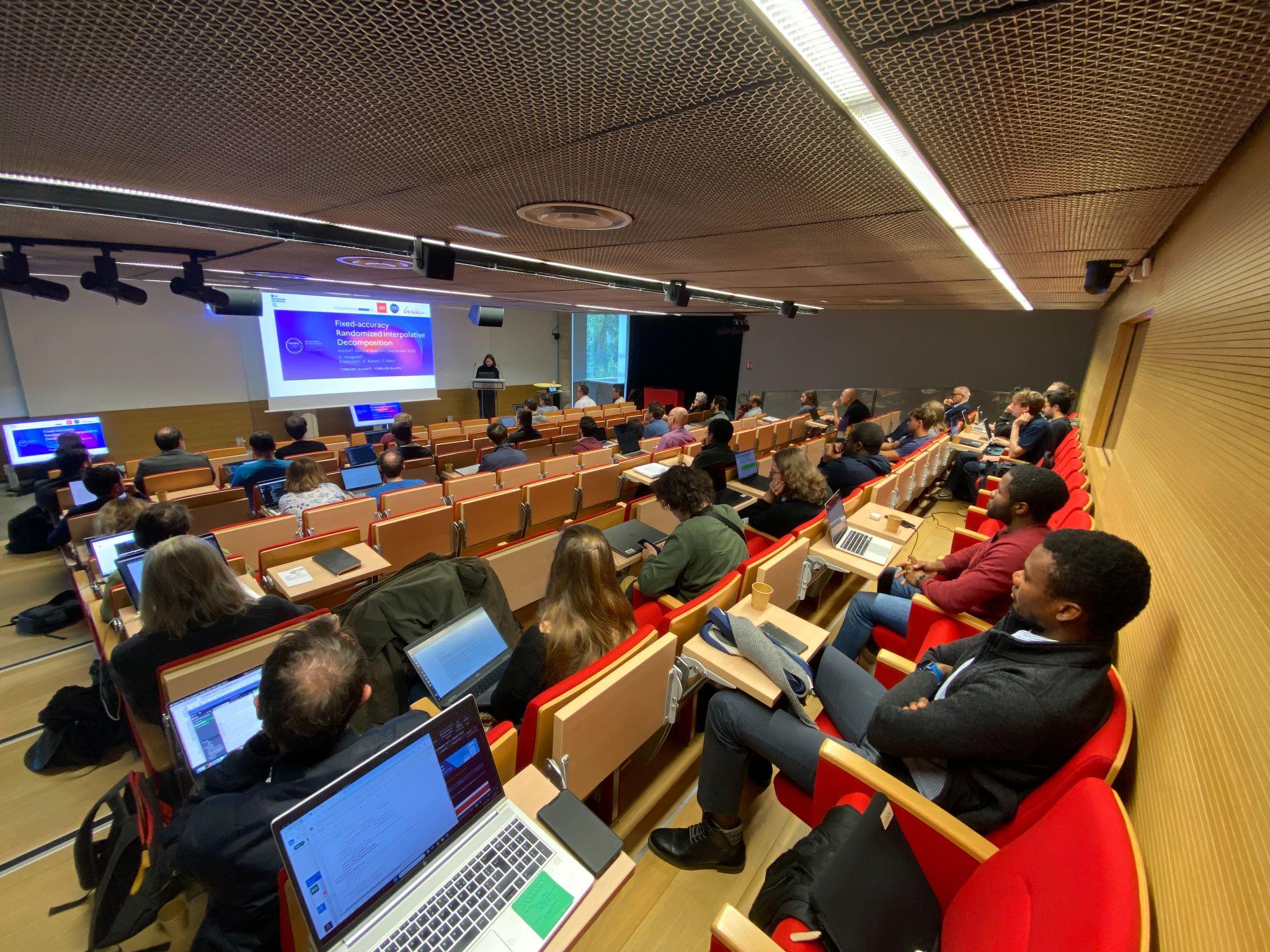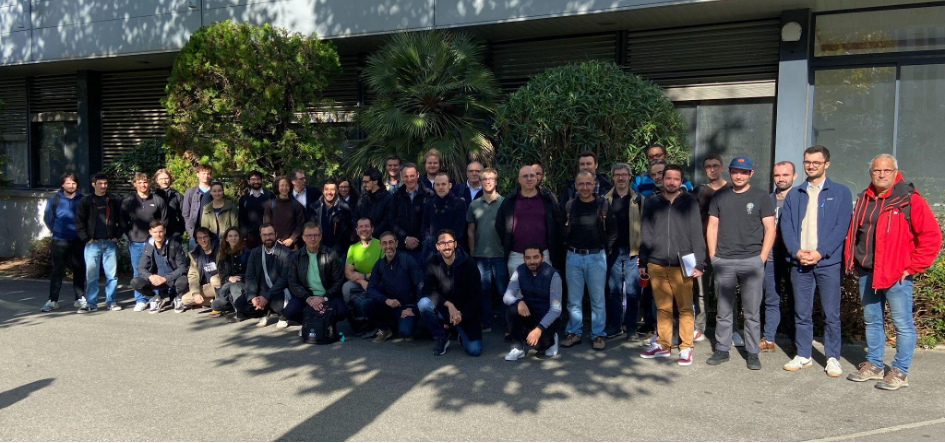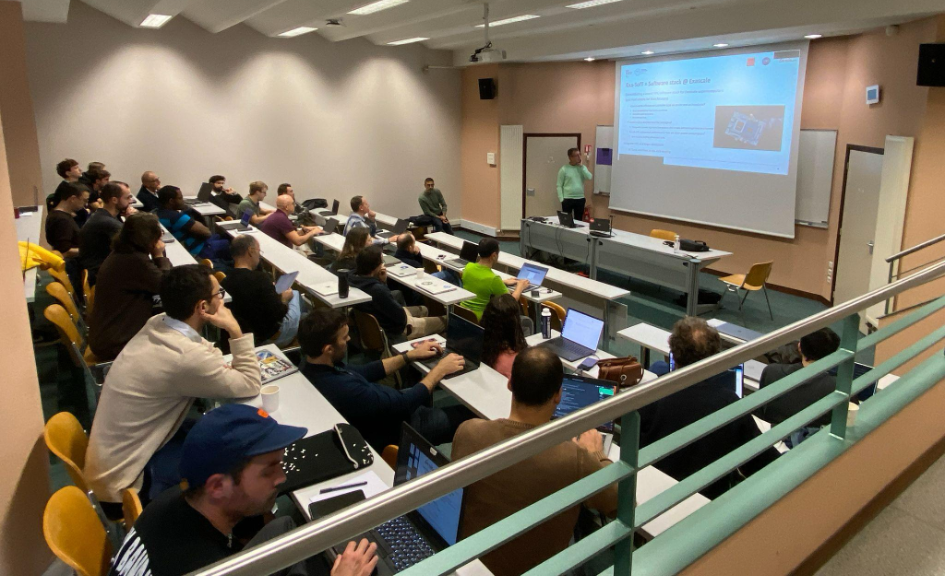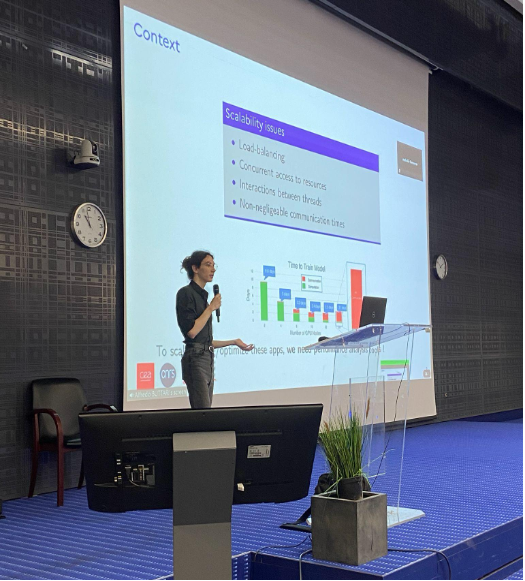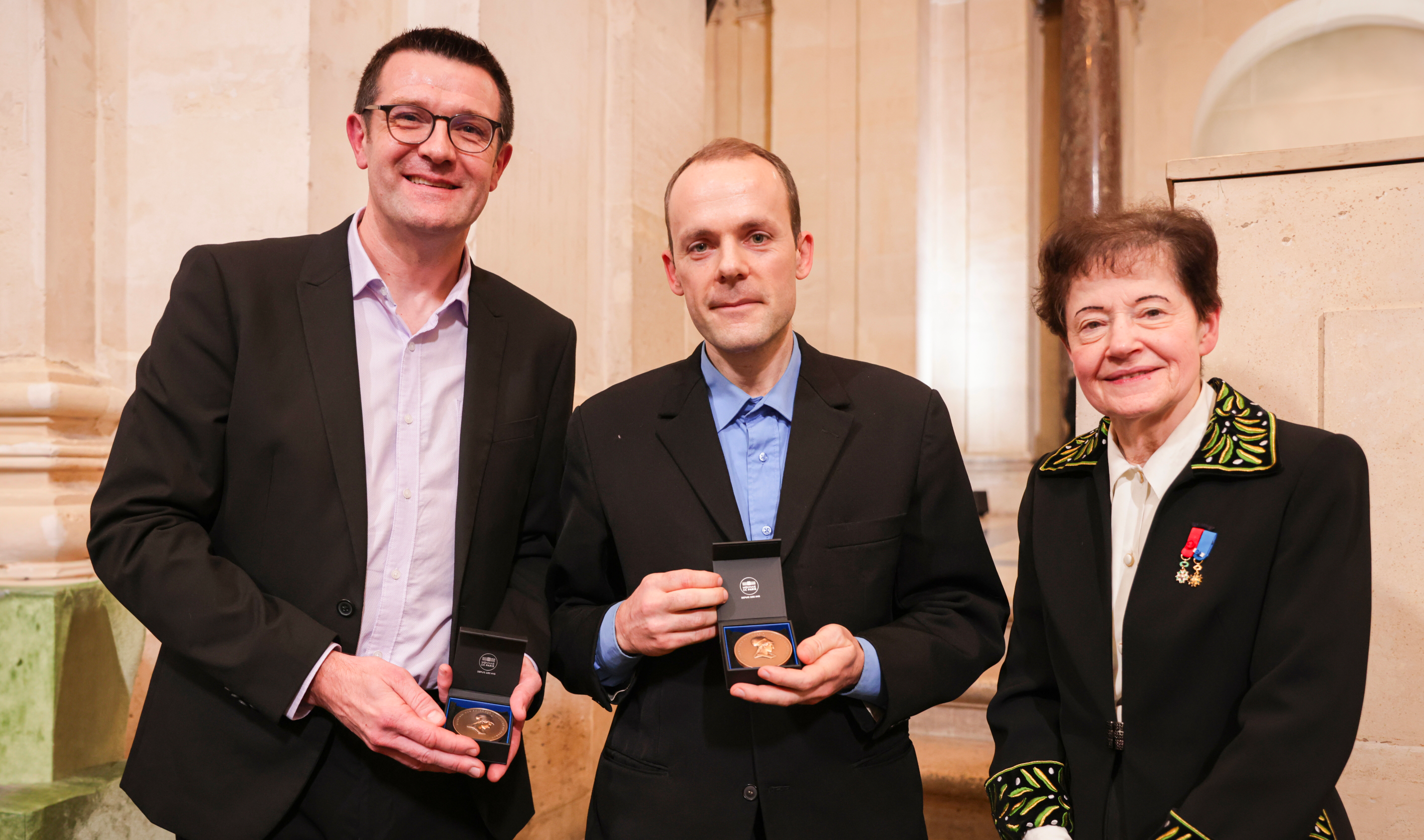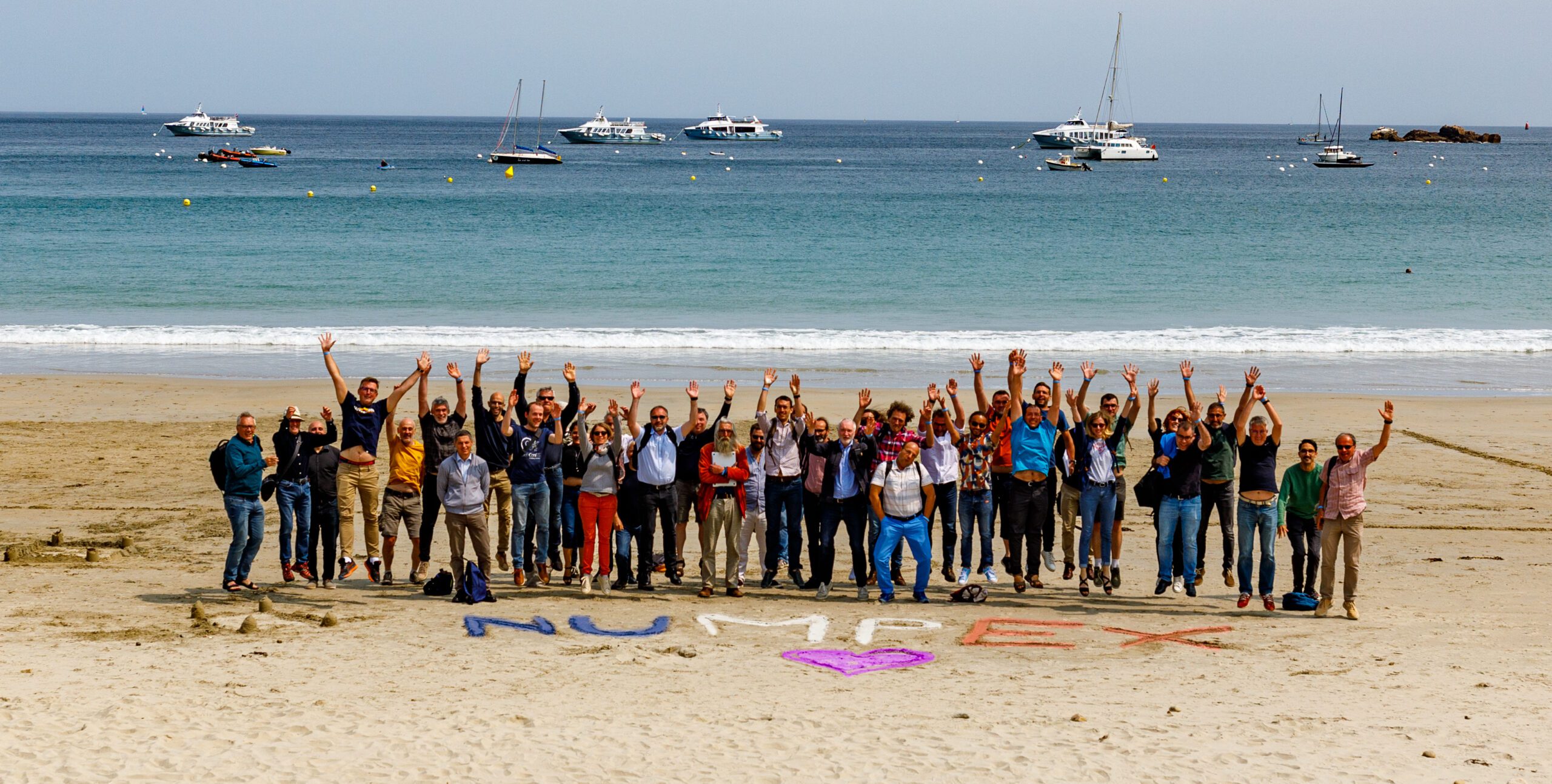A new generation of linear algebra libraries for modern supercomputers
Find all the information about Exa-SofT here.
Linear algebra libraries lie at the core of scientific computing and artificial intelligence. By rethinking their execution on hybrid CPU/GPU architectures, new task-based models enable significant gains in performance, portability, and resource utilization.
Libraries for solving or manipulating linear systems are used in many fields of numerical simulation (aeronautics, energy, materials) and artificial intelligence (training). We seek to make these libraries as fast as possible on supercomputers combining traditional processors and graphics accelerators (GPUs). To do this, we use asynchronous task-based execution models that maximise the utilisation of computing units.
This is an active area of research, but most existing approaches face the difficult problem of dividing the work into the ‘right granularity’ for heterogeneous computing units. Over the last few months, we have developed several extensions to a task-based parallel programming model called STF (Sequential Task Flow), which allows complex algorithms to be implemented in a much more elegant, concise and portable way. By combining this model with dynamic and recursive work partitioning techniques, we significantly increase performance on supercomputers equipped with accelerators such as GPUs, in particular thanks to the ability to dynamically adapt the granularity of calculations according to the occupancy of the computing units. For example, thanks to this approach, we have achieved a 2x speedup compared to other state-of-the-art libraries (MAGMA, Parsec) on a hybrid CPU/GPU computer.
Linear algebra operations are often the most costly steps in many scientific computing, data analysis and deep learning applications. Therefore, any performance improvement in linear algebra libraries can potentially have a significant impact for many users of high-performance computing resources.
The proposed extensions to the STF model are generic and can also benefit many computational codes beyond the scope of linear algebra.
In the next period, we wish to study the application of this approach to linear algebra algorithms for sparse matrices as well as to multi-linear algebra algorithms (tensor calculations).
Adapting granularity allows smaller tasks to be assigned to CPUs, which will not occupy them for too long, thus avoiding delays for the rest of the machine, while continuing to assign large tasks to GPUs so that they remain efficient.

Figure: Adjusting the grain size allows smaller tasks to be assigned to CPUs, which will not take up too much of their time, thus avoiding delays for the rest of the machine, while continuing to assign large tasks to GPUs so that they remain efficient.
© PEPR NumPEx
The 2025 annual meeting of Exa-Soft
The 2025 Exa-SofT Annual Assembly took place from 19 to 21 October, 2025, bringing together more than 60 researchers and engineers from academia and industry to discuss progress on scientific computing software, share results from work packages, and welcome the latest recruits.
Thursday, 19 October 2025
- General presentation of the project within its broader context (NumPEx)
by Raymond Namyst, professor at University of Bordeaux
and Alfredo Buttari, CNRS research scientist - Overview of each Work Package (WP)
by WP leaders
WP1 – Efficient and composable programming
models
By Marc Perache, CEA
Christian Perez, Inria
WP2 – Compilation and Automatic Code
Optimization
By Philippe Clauss, Inria
WP3 – Runtime Systems at Exascale
By Samuel Thibault, University of Bordeaux
WP4 – Numerical Libraries
By Marc Baboulin, Université Paris-Saclay
Abdou Guermouche, University of Bordeaux
WP5 – Performance analysis and
prediction
By François Trahay, Télécom SudParis
WP6 – Digital for Exascale
Energy management
By Georges Da Costa, Université de Toulouse
Amina Guermouche, Inria - Focus on 3 scientific results by recruits
by Ugo Battiston (WP1 & WP2)
Alec Sadler (WP2)
Erwan Auer (WP2)
Friday, 20 October 2025
-
Focus on 3 scientific results by recruits
by Raphaël Colin (WP2)
Thomas Morin (WP3)
Karmijn Hoogveld (WP4) -
Talk by David Goudin, Eviden
-
Introduction to our latest recruits
by Nicolas Ducarton (WP3)
Brieuc Nicolas (WP4)
Matthieu Robeyns (WP4)
Samuel Mendoza (WP4)
Jules Evans (WP6)
Assia Mighis (WP6)
3 minutes each to introduce themselves and their research -
3 presentations of mini-apps by Exa-DI
Proxy-Geos
by Henri Calandra, Total Energies
Dyablo
by Arnaud Durocher, CEA
Unstructured mesh generation for Exascale systems: a proxy application approach
by Julien Vanharen, Inria
20 minutes per mini-app: presentation + discussion on objectives, coding, status, needs, bottlenecks, and support from PC2 -
Breakout sessions for regular members / private exchanges for Board members
by Henri Calandra, Arnaud Durocher, Julien Vanharen
Technical discussions between Exa-Soft members and mini-app developers -
Board meeting feedback to Exa-Soft leaders
Session restricted to Board members, Exa-Soft leaders, and ANR
Saturday, 21 October 2025
-
Breakout sessions feedback
-
Focus on 3 scientific results by recruits
by Catherine Guelque (WP5)
Jules Risse (WP5 & WP6)
Albert d’Aviau (WP6) -
Final word: next milestones, deliverables
by Raymond Namyst, professor at University of Bordeaux
and Alfredo Buttari, CNRS research scientist
Attendees
- Emmanuel Agullo, Inria
- Erwan Auer, Inria
- Ugo Battiston, Inria
- Marc Baboulin, Université Paris-Saclay
- Vicenç Beltran Querol, BSC
- Jean-Yves Berthou, Inria
- Julien Bigot, CEA
- Jérôme Bobin, CEA
- Valérie Brenner, CEA
- Elisabeth Brunet, Telecom SudParis
- Alfredo Buttari, CNRS
- Henri Calandra, Total Energies
- Jérôme Charousset, CEA
- Philippe Clauss, Inria
- Raphaël Colin, Inria
- Albert d’Aviau de Piolant, Inria
- Georges Da Costa, Université de Toulouse
- Marco Danelutto, Université de Pise
- Stéphane de Chaisemartin, IFPEN
- Alexandre Denis, Inria
- Nicolas Ducarton, Inria
- Arnaud Durocher, CEA
- Assia Mighis, CNRS
- Bernd Mohr, Jülich
- Thomas Morin, Inria
- Jules Evans, CNRS
- Clémence Fontaine, ANR
- Nathalie Furmento, CNRS
- David Goudin, Eviden
- Catherine Guelque, Telecom SudParis
- Abdou Guermouche, Université de Bordeaux
- Amina Guermouche, Inria
- Julien Herrmann, CNRS
- Valentin Honoré, ENSIIE
- Karmijn Hoogveld, CNRS
- Félix Kpadonou, CEA
- Jerry Lacmou Zeutouo, Université de Picardie
- Sherry Li, Lawrence Berkeley National Laboratory
- Pérache Marc, CEA
- Théo Mary, CNRS
- Samuel Mendoza, Inria
- Julienne Moukalou, Inria
- Raymond Namyst, Université de Bordeaux
- Brieuc Nicolas, Inria
- Alix Peigue, INSA
- Christian Perez, Inria
- Lucas Pernollet, CEA
- Jean-Marc Pierson, IRIT
- Pierre-Etienne Polet, Inria
- Marie Reinbigler, Inria
- Vincent Reverdy, CNRS
- Jules Risse, Inria
- Matthieu Robeyns, IRIT
- Alexandre Roget, CEA
- Philippe Swartvaghe R, Inria
- Boris Teabe, ENSEEIHT
- Samuel Thibault, Université de Bordeaux
- François Trahay, Telecom SudParis
- Julien Vanharen, Inria
- Jean-Pierre Vilotte, CNRS
- Pierre Wacrenier, Inria
© PEPR NumPEx
The 2024 annual meeting of Exa-Soft
The second Exa-SofT annual assembly, held on November 7th-8th, 2024 at ENSEEIHT in Toulouse, brought together over 50 participants from academia and industry to share progress on scientific computing applications, strengthen collaborations, and introduce the new members of Exa-SofT.
Thursday, 07 November 2024
- Opening Talk
by Raymond Namyst, professor at University of Bordeaux
and Alfredo Buttari, CNRS research scientist - WP1 Scientific presentation – COMET: from dynamic data-parallel dataflows to task graphs
by Jerry Lacmou Zeutouo, associate professor at IUT Amiens
and Christian Perez, Inria research scientist - WP4 Scientific presentation – Tensor computations
Atte Torri, PhD student at Paris-Saclay University - General workshop – Exa-SofT software stack consolidation
animated by Abdou Guermouche, associate professor at University of Bordeaux
and Christian Perez - WP2 & WP1 Scientific presentation – Polyhedral model for Kokkos code optimization
by Ugo Battiston, Inria PhD student - WP3 Scientific presentation – Recursive tasks
by Thomas Morin, PhD student at University of Bordeaux - WP2 Scientific presentation – Automatic multi-versioning of computation kernels
by Raphaël Colin, Inria PhD student under the supervision of Philippe Clauss and Thierry Gautier - WP4 & WP6 Scientific presentation – Improving energy efficiency of HPC application
by Albert d’Aviau de Piolant, PhD student at University of Bordeaux
Friday, 8 November 2024
- NumPEx Energy working group feedback
by Georges Da Costa, professor at University of Toulouse
and Amina Guermouche, associate professor at Bordeaux INP - General workshop – Exa-SofT developments integration in applications
by Marc Pérache, CEA research scientist
and François Trahay, professor at Telecom SudParis - WP5 Scientific presentation – PALLAS: a generic trace format for large HPC trace analysis
by Catherine Guelque, PhD student at Telecom ParisSud - WP5 & WP6 Scientific presentation – Fine-grain energy measurement
by Jules Risse, PhD student at Telecom ParisSud - NumPEx GPU working group feedback
Samuel Thibault, professor at University of Bordeaux
Attendees
- Ugo Battinston, Inria
- Julien Bigot, CEA
- Alfredo Buttari, CNRS
- Philippe Clauss, Inria
- Henri Calandra, Total Energies
- Terry Cojean, Eviden
- Raphaël Colin, Inria
- Benoit Combemale, Inria
- Jean-Marie Couteyen, Airbus
- Albert d’Aviau de Piolant, Inria
- Georges Da Costa, Université de Toulouse
- Alexandre Denis, Inria
- Nicolas Ducarton, Inria
- Pierre Esterie, Inria
- Ewen Brune, Inria
- Mathieu Faverge, Inria
- Thierry Gautier, Inria
- David Goudin, Eviden
- Karmijn Hoogveld, Université de Toulouse
- Catherine Guelque, Telecom SudParis
- Amina Guermouche, Bordeaux INP
- Abdou Guermouche, Université de Bordeaux
- Julien Hermann, CNRS
- Jerry Lacmou Zeutouo, Université de Picardie
- Marc Pérache, CEA
- Raymond Namyst, Université de Bordeaux
- Nicolas Brieuc, Inria
- Alena Kopanicakova, Toulouse INP
- Christian Perez, Inria
- Luc Giraud, Inria
- Alejandro Estana, Université de Toulouse
- Lucas Pernollet, CEA
- Millian Poquet, Université de Toulouse
- Jules Risse, Telecom SudParis
- Julien Vanharen, Inria
- Alec Sadler, Inria
- Nicolas Renon, Université de Toulouse
- Philippe Swartvagher, Inria
- Samuel Thibault, Université de Bordeaux
- François Trahay, Telecom SudParis
- Pierre Matalon, École polytechnique
- Atte Torri, Université Paris-Saclay
- Bora Ucar, ENS
- Pierre-André Wacrenier, Université de Bordeaux
- Damien Gratadour, Université Paris Cité
- Petr Vacek, IFPEN
- Matthieu Robeyns, Université Paris-Saclay
- Nathalie Furmento, CNRS
© PEPR NumPEx
Brice Goglin and Samuel Thibault: HPC mapping experts awarded by the french Académie des sciences
Article originally published on Inria website here
Every November, the french Académie des sciences unveils its prestigious awards. This year, alongside Brice Goglin, the NumPEx member Samuel Thibault have just been awarded the Inria – Académie des sciences – Dassault Systèmes Innovation Prize.
Samuel Thibault is responsible for the runtime part of the Exa-SofT software stack. More specifically, he is in charge of the integration of communications with task scheduling, high-level expression of the division of computational tasks, and fault tolerance. Samuel is also co-leader of the working group Accelerator.
Learn more about his research in the article published by Inria.
Photo credit académie des sciences – Mathieu Baumer
Unleashing the Power of Exascale Computing: Genci's 2022 Activity Report
We are thrilled to present the highly anticipated activity report of Genci for the year 2022.
As a leading organization responsible for providing powerful computational and data processing resources, Genci has been instrumental in driving scientific research and innovation at both the national and European levels.
With a mission to promote the use of supercomputing coupled with artificial intelligence, Genci has made significant strides in benefitting scientific research communities, academia, and industrial sectors. Join us as we explore the remarkable achievements showcased in this 68-page report.

Launching Innovative Programs and Initiatives:
Genci’s commitment to pushing the boundaries of computational capabilities is evident through the launch of several groundbreaking programs and initiatives. The report highlights key projects, such as:
- NumPEx: The NumPEx initiative aims to harness the power of supercomputing and AI to drive scientific progress. By providing researchers with cutting-edge computational resources, Genci enables them to tackle complex challenges across various scientific domains.
- Jules Verne Consortium for Exascale: Genci’s partnership in the Jules Verne Consortium demonstrates their dedication to advancing exascale computing. This collaboration fosters innovation and propels research in areas that were once unimaginable.
- CLUSSTER Project: The CLUSSTER project focuses on integrating cloud computing solutions into Genci’s infrastructure. By embracing the cloud, Genci enhances flexibility and scalability, enabling researchers to tackle data-intensive workloads with ease.
- New Supercomputer “Adastra”: Genci’s introduction of the state-of-the-art supercomputer “Adastra” marks a significant milestone. With its remarkable computational power, Adastra empowers researchers to tackle complex simulations, accelerate data analysis, and drive scientific breakthroughs.
Driving Quantum Computing Advancements:
Genci recognizes the immense potential of quantum computing and has made significant progress in this field. The report highlights notable achievements, including:
- National Hybrid Quantum Computing Platform: Genci has played a pivotal role in launching of this platform. This initiative fosters collaboration and enables researchers to explore the capabilities of quantum computing in solving real-world problems.
- Integration of Quantum Systems: Genci has acquired its first quantum systems, marking a significant step towards enabling researchers to harness the power of quantum computing. These systems pave the way for groundbreaking research and innovation in quantum-enabled applications.
- The Quantum Package: Genci’s Quantum Package (PAck Quantique) provides researchers with the necessary tools and resources to explore hybrid quantum computing systems. This initiative promotes the development of novel algorithms and applications that bridge classical and quantum computing.
Advancements in Artificial Intelligence:
Genci has embraced the transformative potential of artificial intelligence, as highlighted in the report:
Bloom Model: Genci’s Bloom Model showcases their efforts to develop cutting-edge AI algorithms and frameworks. By combining supercomputing with AI, Genci facilitates breakthrough research in machine learning, deep learning, and data analytics.
Contributing to Scientific Research and Industry:
Genci is dedicated to supporting scientific research communities, academia, and industrial sectors through different initiatives, as exemplified by their efforts in:
- Reusing Waste Heat: Genci’s innovative approach includes the valorization of waste heat generated by the Jean Zay supercomputer. This environmentally friendly initiative showcases Genci’s dedication to sustainability and efficient resource utilization.
- Grands Challenges: Genci actively supports researchers in tackling grand challenges, providing them with the computational resources needed to address complex problems across diverse scientific disciplines.
- Exemplary Simulations: The report presents compelling examples of simulations conducted with Genci’s resources, showcasing the impactful discoveries and advancements made possible through their support.
- Community of Large Industrial Groups: Genci’s collaboration with large industrial groups highlights their commitment to bridging the gap between academia and industry. By fostering partnerships, Genci facilitates the transfer of cutting-edge research and technological advancements into real-world applications.
Genci’s Regional and European Ecosystem:
The report highlights Genci’s active involvement in regional and European initiatives:
- Regional Initiatives: Genci actively contributes to regional development through initiatives like SiMSEO, Competence Center, and MesoNet. These programs encourage cooperation among research institutions and industries, which promotes innovation and contributes to economic growth..
- European Collaborations: Genci’s participation in European collaborations, such as PRACE, EuroHPC, EUPEX, and EPI SGA, underscores their commitment to establishing a strong European ecosystem for high-performance computing. These collaborations facilitate knowledge exchange, resource sharing, and foster a vibrant European research community.
The 2022 Activity Report by Genci demonstrates their commitment to empowering scientific research and driving innovation by integrating exascale computing, artificial intelligence, and quantum computing.
Through the launch of groundbreaking programs, the introduction of cutting-edge technologies, and collaborations with research communities and industry, Genci has made significant contributions to advancing scientific frontiers.
Their commitment to sustainable practices and regional and European partnerships further solidifies their position as a leading provider of computational resources.
As we look to the future, Genci continues to pave the way for transformative discoveries and breakthroughs in scientific research and technological innovation.
NumPEx Launches into Action with an Ambitious Kick-Off Agenda in Perros-Guirrec
In a series of dynamic sessions hosted from June 26th to 28th in the charming town of Perros-Guirrec, NumPEx embarked on an intensive kick-off event, setting the stage for a transformative journey in Exascale computing. Leaders, experts, and collaborators convened to delve into an agenda rich with insights,workshops, and collaborative initiatives.

The kick-off began with a comprehensive introduction, outlining the objectives and significance of the NumPEx program, aiming to establish a common vision and foster collaboration to implement a coherent software stack and related processes by 2025, benefiting not only France but also Europe, in preparation for the Exascale machine. Key figures such as Jerome Bobin, Michel Dayde, and Jean-Yves Berthou elaborated on the program's goals and organizational structure. Board members shared their perspectives on the Exascale vision and roadmaps:
GENCI's Exascale Vision and Roadmap:
- Presentation of GENCI's role and missions, including hosting the Exascale project for EuroHPC.
- European HPC initiative partnership with EuroHPC and others, leveraging PRACE and GEANT.
- Introduction of the Jules Verne consortium, highlighting international and industrial partnerships.
- Vision of the European Exascale machine: addressing societal challenges, fostering innovation, and emphasizing HPC/IA data-centric convergence.
- Collaboration plans with NumPEx, including building a functional program, benchmark development, and product promotion.
Eviden Exascale Vision and Roadmap:
- Eviden's complex approach involving HPC, HPDA, IA, and quantum technologies with a focus on sovereign and European components.
- Involvement in the European integrated processor for Exascale machines (SiPearl) and collaborations with various technology projects.
- Collaboration with CEPP for application support and participation in technology projects related to Exascale, quantum, cloud, and more.
National and European Ecosystem:
- Introduction of EUPEX, a 4-year project with a budget similar to NumPEx, aiming to deploy a modular Exascale system using the OpenSequana architecture.
- Collaboration with NumPEx, potential for shared experiments and results, and exploration of common dissemination.
- Presentation of Data Direct Network (DDN) with a focus on AI and Lustre parallel file system, highlighting challenges and the importance of understanding NumPEx applications.
The afternoon continued with a tour of the five projects (PCs) within the NumPEx program:
- Exa-MA, which aims to design scalable algorithms and numerical methods for forthcoming exascale machines. Led by Christophe Prudhomme (Université de Strasbourg) and Helene Barucq (Inria).
- Exa-Soft, to develop a coherent, portable, efficient, and resilient software stack for exascale. Led by Raymond Namyst (Inria) and Alfredo Buttari (CNRS - Centre national de la recherche scientifique).
- Exa-DoST, to overcome challenges relating to data, notably storage, I/O, in situ processing, and smart analytics, in exascale supercomputers. Led by Gabriel Antoniu (Inria) and Julien Bigot (CEA).
- Exa-ATOW, to deal with large-scale workflows involving exascale machines. Led by François Bodin (Université de Rennes), Mark Asch (Université de Picardie Jules Verne (UPJV)), and Thierry Deutsch (CEA).
- Exa-DI, to ensure transverse co-design and software productivity for exascale supercomputers. Led by Jean-Pierre Vilotte (CNRS) and Valérie Brenner (CEA).
The day concluded with an emphasis on the collaborative efforts between NumPEx and other initiatives, with a focus on benchmark development, software-hardware links, and the overall goal of preparing for the challenges of the Exascale era.
The second day kicked off with an invigorating early morning jog along the seashore, setting a vibrant tone for a day filled with thematic workshops. Participants engaged in focused discussions on energy synergies, GPU integration, applications, co-design, gender/diversity/equity, software production integration, training, resilience, international collaborations, and artificial intelligence. Thematic workshops, led by domain experts, fostered collaboration within smaller groups, emphasizing the program's commitment to a transverse approach to Exascale challenges.
The final day commenced with a synthesis of workshop outcomes, highlighting the depth of discussions within each thematic area. Workshop leaders consolidated insights, offering a panoramic view of challenges and opportunities. Here is an overview of the key insights and strategic actions discussed during these workshops:
GPU Accelerators Workshop
In a dedicated workshop on GPU Accelerators, experts emphasized the pivotal role of Graphics Processing Units (GPUs) in achieving exascale computing. With 90-99% of large machine performance attributed to GPU acceleration, the workshop highlighted the need for applications to explore the potential of these powerful processors. Challenges discussed included new programming paradigms, code portability, data management, and the hardware landscape driven by gaming and artificial intelligence. The workshop outlined a comprehensive plan, including future workshops, analysis papers, tutorials, hackathons, and examples of successfully ported mini-apps.
Energy Workshop
The Energy Workshop focused on achieving Exascale computing within a power consumption limit of 20MW. Experts delved into environmental, scientific, technical, and societal dimensions, providing a roadmap for the HPC community. Key challenges identified included modeling system consumption, real-time measurement tools, resource prioritization based on societal impact, and the broader environmental impact of research activities. The action plan involves developing a performance and consumption model, optimization strategies, tools for users, and fostering links with external entities to incorporate energy considerations.
Gender Equity and Diversity Seminar
The action plan includes the establishment of a Code of Conduct, assessment of gender distribution, creation of a web platform for resources, education and training initiatives, awareness and outreach programs, and dedication to accessibility and recognition. NumPEx aims to create an inclusive and collaborative future, inviting all stakeholders to contribute to the initiatives.
AI Workshop
The AI Workshop explored the critical intersection of HPC and AI, addressing challenges and outlining a strategic plan for collaborative exploration. Key discussions included decision support tools for AI applications in HPC, optimizing runtimes for AI models, and converging HPC and AI usages. The action plan involves establishing an AI Working Group, conducting transversal workshops, and developing fundamental building blocks for a convergent future.
Training Strategies Workshop
The Training Strategies Workshop addressed the complexities of training in the context of the impending exascale era. Discussions included the scope and subjects of training programs, the creation of sustainable training models, and economic considerations in training initiatives. The workshop emphasized collaborative and inclusive training initiatives to prepare the scientific community for the challenges and opportunities of exascale computing.
International Collaborations Workshop
The International Collaborations Workshop focused on identifying challenges and setting objectives for enhanced collaborative frameworks on a European and global scale. Discussions covered scientific and technological challenges, the design and development of the exascale software stack, and strategic action plans. The outlined roadmap includes hosting workshops, exchanging insights and experiences, and strengthening collaborations with international entities.
National Centers Integration Workshop
The National Centers Integration Workshop aimed to align NumPEx with HPC infrastructures, emphasizing operational elements between computing centers and NumPEx 's targeted projects. Discussions covered operational assessment, cybersecurity, job profiling, and traceability. The workshop set a plan for regular video conferences, ensuring ongoing communication and collaboration.
Software Production Workshop
The Software Production Workshop focused on streamlining software development practices in the HPC domain. Challenges discussed included bridging silos, enforcing good practices, and amplifying impact. Insights and conclusions highlighted diverse development practices, sustainability models, and the deployment of continuous integration and certification. NumPEx 's commitment to advancing software production practices aims to foster innovation, collaboration, and sustainable development in HPC.
Exascale Resilience Workshop
The Exascale Resilience Workshop navigated complexities associated with exascale application deployment. Discussions covered diverse approaches across NumPEx PCs, key challenges, and strategic choices. The action plan involves listing and analyzing application needs, analyzing barriers to library adoption, and scrutinizing international solutions. NumPEx aims to foster collaborative solutions for enhanced application resilience at a global scale.
Applications and Co-Design Workshop
The Applications and Co-Design Workshop promoted co-development strategies for advanced application development. Discussions included challenges in co-design, key questions for collective exploration, building connections, and initiatives for sustainability. The workshop set the stage for upcoming co-development project workshops, emphasizing collaboration and innovation.

